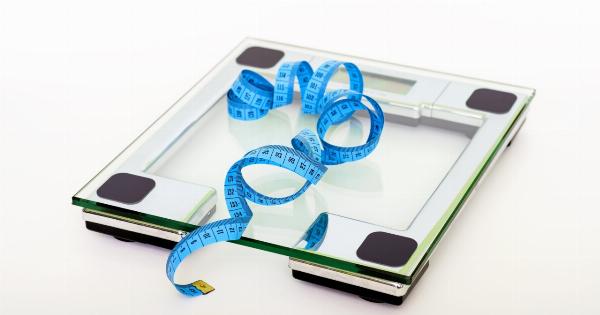Weight is a measure of the force exerted on an object by gravity, but it is also widely used as an indicator of health and wellness.
Many people track their weight regularly to monitor changes, whether they are trying to lose or gain weight or simply maintain a healthy lifestyle. However, the question often arises as to when is the best time to weigh yourself to get the most accurate reading and track progress effectively.
In this article, we will explore different factors that can affect your weight and discuss the optimal time for weighing yourself.
Factors that influence your body weight
Before we dive into the ideal time for weighing yourself, it is essential to understand that body weight can fluctuate throughout the day due to various factors. These factors include:.
1. Time of day
Your weight can fluctuate based on the time of day due to factors like water retention and food intake. Therefore, it is crucial to choose a consistent time for weighing yourself to eliminate variations caused by these factors.
2. Food and water intake
Consuming food and beverages prior to weighing yourself can significantly affect your weight reading. Food and water add to your body’s overall mass, leading to a temporary increase in weight.
It is generally recommended to weigh yourself before breakfast or after using the restroom for more accurate results.
3. Clothing
The clothes you wear can add extra weight to the scale. It is advisable to weigh yourself in minimal or no clothing to get a more accurate measurement.
If you prefer to weigh yourself fully dressed, make sure to wear similar clothing each time you weigh in.
4. Physical activity level
Your physical activity level can impact your weight due to changes in muscle mass and water retention. Engaging in intense workouts or strength training can lead to temporary weight gain as your body repairs and rebuilds muscle tissue.
If you want to track your progress accurately, it is best to weigh yourself at a consistent time relative to your exercise routine.
5. Menstrual cycle
For women, the menstrual cycle can influence weight fluctuations due to hormonal changes. It is common to experience water retention and bloating during certain phases of the menstrual cycle, which can momentarily increase your weight.
If you want to avoid these variations, it is advisable to choose a specific time in your cycle to weigh yourself consistently.
The best time to weigh yourself
Considering the factors mentioned above, the best time to weigh yourself is in the morning, after using the restroom, and before having breakfast.
This ensures that your weight is not influenced by food or water intake, and minimizes variations caused by clothing or physical activity. Weighing yourself daily at this time can provide a more accurate and consistent representation of your weight.
It’s important to note that the number on the scale is just one aspect of overall health. Body composition, muscle mass, and overall well-being should also be considered when assessing progress.
If you are working towards specific fitness goals, tracking measurements, body fat percentage, or using other metrics may provide a more comprehensive picture of your progress.
Tips for effective weight tracking
Here are some additional tips to ensure effective weight tracking:.
1. Use the same scale
Using the same scale for measurements eliminates discrepancies between different scales. Different scales may have slight variations in calibration, which can affect the accuracy of your readings.
2. Weigh yourself weekly
While weighing yourself daily can provide a good idea of trends and fluctuations, it can also lead to unnecessary stress and obsession over small day-to-day changes.
Weighing yourself once a week, preferably on the same day and time, allows you to track progress without becoming fixated on daily variations.
3. Focus on overall trends
A single weight measurement should not be the sole determinant of progress or success. Instead, focus on the overall trends over time.
Body weight can fluctuate from day to day, so it’s essential to look at the bigger picture and track progress over weeks or months rather than obsessing over daily changes.
Conclusion
Weighing yourself can be a beneficial tool for tracking progress and managing your health goals.
By understanding the factors that can influence your weight and choosing the best time to weigh yourself, you can ensure more accurate and consistent measurements. Remember that weight is just one aspect of overall wellness, and it’s important to consider other factors such as body composition, muscle mass, and overall well-being for a comprehensive assessment of your progress.






























